Part I: Departing the "Real World" and the Quest for Land
As I bound my breasts and put on men's clothes, I remember thinking how crazy I was. In two years, I went from being an executive in the "c-suite" of a large real estate finance company in New York to disguising myself as a Bangladeshi man so that I could go look for land in the rural areas of southern Bangladesh. So what made me give up a six figure job at the top of the corporate ladder, donate everything I owned to charity, and move to a developing country that few people can locate on a map? In a word: passion.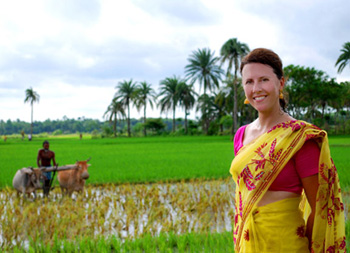
I was making money in New York, but I wasn't making a difference. I had reached the top of my chosen career field by age thirty and was bored. I wanted to change my life so that I could do something that I loved and make more of an impact on the world, but it was a lecture that I attended at the Cornell Club that really sounded the clarion call for me. Stuart Hart, a professor at the Cornell Johnson Business School, gave a lecture about alternative energy in developing countries; he threw out a statistic that I could not believe when I heard it: he said that of the 6 billion people in the world, 4 billion of them live in poverty. It shocked me to the core of my being. I considered myself a well-educated and well-traveled individual, and for me to not have known how most of the people in the world live made me question everything that I knew about myself.
That talk set in motion a series of events that lead me to apply for a Fulbright Fellowship to Bangladesh where I did a year of service and spent some time examining my priorities. When my Fulbright ended, I realized that I could no longer return to my old life and that the time had finally come to spread my wings and jump. I had the idea to create sustainable boutique resorts before I left New York (it combined my interests in environmentalism, real estate, design, and travel), but I certainly never thought that I would start in Bangladesh! After living in the country for a year, however, I realized that there were several thousand foreign expatriates and wealthy Bangladeshis who desperately needed a quiet, beautiful, relaxing country retreat away from the crowds, noise, and pollution of Dhaka.
While working on my Fulbright project I connected with German architect Anna Heringer who built an award-winning school from mud in the northern part of Bangladesh. I was inspired by her work and decided to create a resort out of mud and bamboo.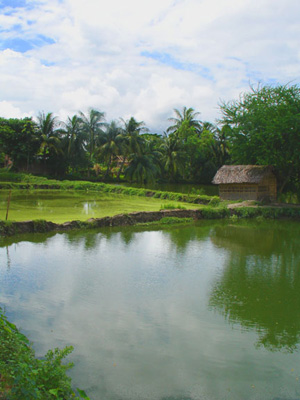
I chose the location for my resort strategically -- Jessore is near one of the few regional airports in Bangladesh, it is close to the Kolkata Indian border crossing, and it is the major stop-over town for trips to the Sundarban Forest, the world's largest mangrove forest and Bangladesh's main tourist attraction. After selecting the area, I started looking for a site. I flew to Jessore, put on a sari, and hired a rickshaw to take me around the countryside. Village tea stalls were the best source of information about the local area. Normally the exclusive domain of men, I was invited to sit, take tea, and share information about my country, my family, and what I was doing in Bangladesh. After the local leader had determined that my quest was worthwhile, he took me around and showed me several pieces of land that might be available. While the search was fun and the scenery breathtaking, I soon realized that I was getting the bideshir dam (foreigner's price quote) for the land.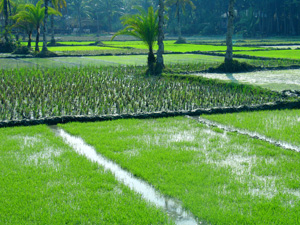
On my fourth trip down to Jessore, I hooked up with a local named Koli. I liked Koli from the start -- he was friendly, enthusiastic, and I instantly felt that I could trust him. Koli wasn't a broker, but he knew the area and offered to show me some land. I had originally planned to fly back to Dhaka that same evening, but Koli said that he could show me some more land the next day, so I decided to stay. Koli invited me to spend the night with him and his family. Normally I would have turned down an invitation to come home with a strange man, but Koli explained that he lived with his wife and two children and his brothers and their families, so I took a chance and followed him home.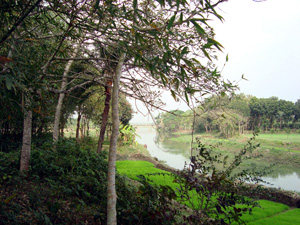
That night I got to experience the amazing hospitality of the Bangladeshi people. With just an hour's notice, his family prepared a huge feast for me of traditional Bangladeshi food. I didn't have any clothes for the next day, so they bought me a shalwar kameez (local type of shirt and pants) and a nightgown. When I left the next morning they gave me fruit and presents and made me promise to come back soon.
Over the next year and a half Koli and I worked together to find the perfect land for the resort. We lost a few pieces along the way -- one for title issues and two because they found out it was a foreigner that was buying the land. Consequently, when we found our current site, I was not initially allowed to go down and see it. I told Koli that I couldn't buy land without seeing it first, so we came up with the idea of disguising me as a Bangladeshi man and driving by on Koli's motorcycle (a woman on the back of a motorcycle, even in a burka, would draw too much attention). So I bound my breasts, put on men's clothes (which also hid my white arms and legs!), donned a motorcycle helmet, and drove to the project site. The disguise worked and I was able to check out the property.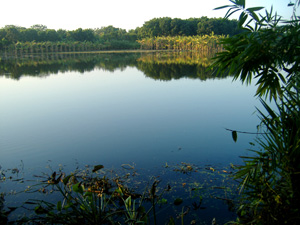
Koli spent the next six months talking to the villagers, forming relationships, and negotiating a price. He explained that we are trying to develop a socially and environmentally responsible resort that will improve the lives of the people in the local community by bringing new businesses and jobs to the area. He told them that we wanted to revive some of the arts and crafts of Bangladesh that are being lost -- like pottery and pakha (palm leaf) goods - and that we would work with the villagers to create products that could be used in the resort and maybe even sold abroad. In the end, the villagers got together and agreed to sell. Today they are working side by side with us to help develop Panigram Resort and Spa -- a place that I hope will allow others like me to get a taste of Bangladeshi village life.
Stay Tuned for Part II -- Four Weeks, Three Interns, Two Cows, and 120 Cubic Feet of Mud